Ethical Issues and Child Labour: A Case Study in Manufacturing
VerifiedAdded on 2023/05/30
|5
|923
|216
Essay
AI Summary
This essay presents an ethical dilemma faced by a production manager who discovers a Thai manufacturer utilizing child labour to produce toys for a confectionery company. The manager must decide between sourcing cheaper products from the unethical manufacturer or maintaining the existing, more expensive, ethical supply chain. The analysis explores two normative theories, deontology and utilitarianism, along with descriptive ethical theories, to evaluate the situation. The essay argues for the application of deontology and the theory of rights, concluding that the manager should prioritize ethical sourcing and inform upper management about the unethical practices. The author emphasizes the importance of ethical decision-making in business and the rejection of child labour.
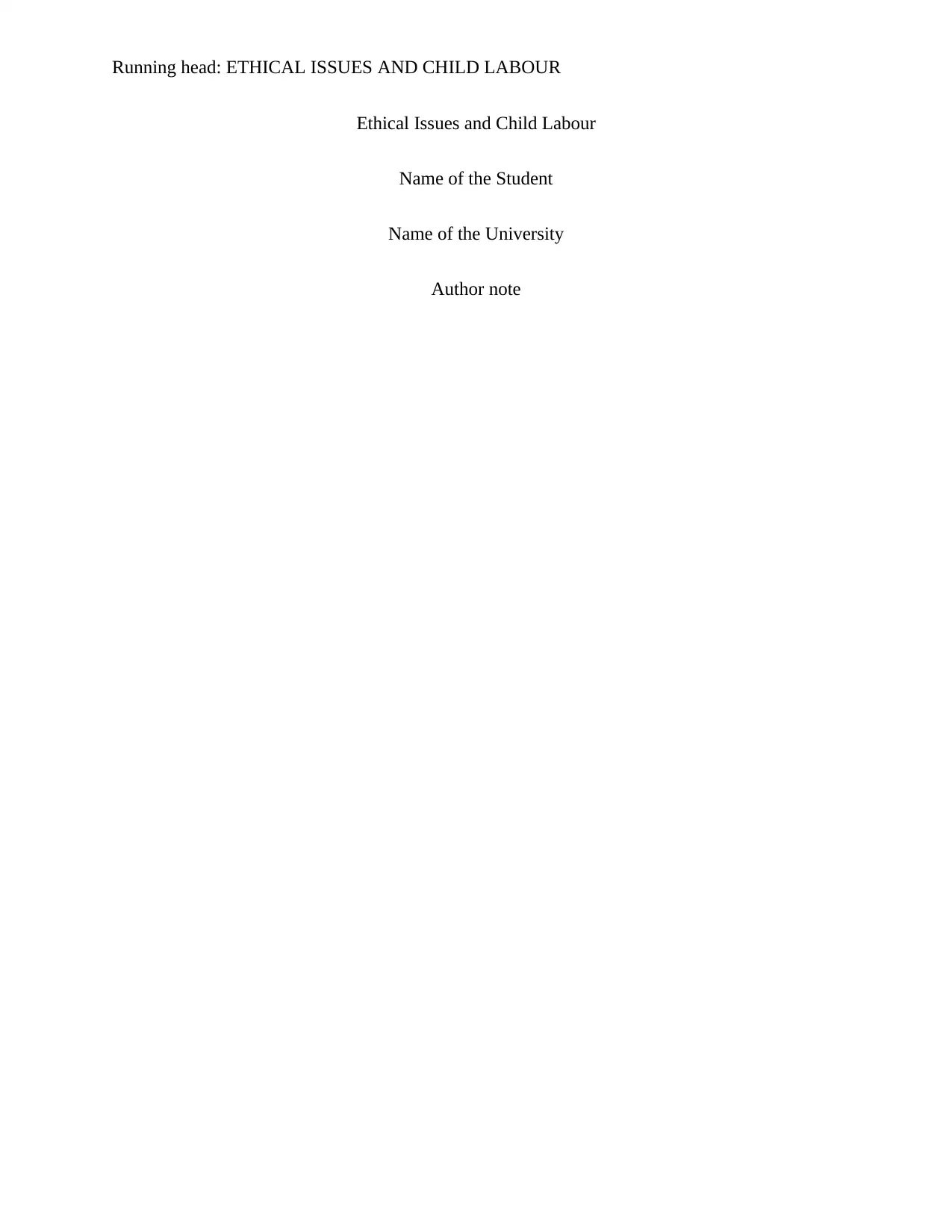
Running head: ETHICAL ISSUES AND CHILD LABOUR
Ethical Issues and Child Labour
Name of the Student
Name of the University
Author note
Ethical Issues and Child Labour
Name of the Student
Name of the University
Author note
Paraphrase This Document
Need a fresh take? Get an instant paraphrase of this document with our AI Paraphraser
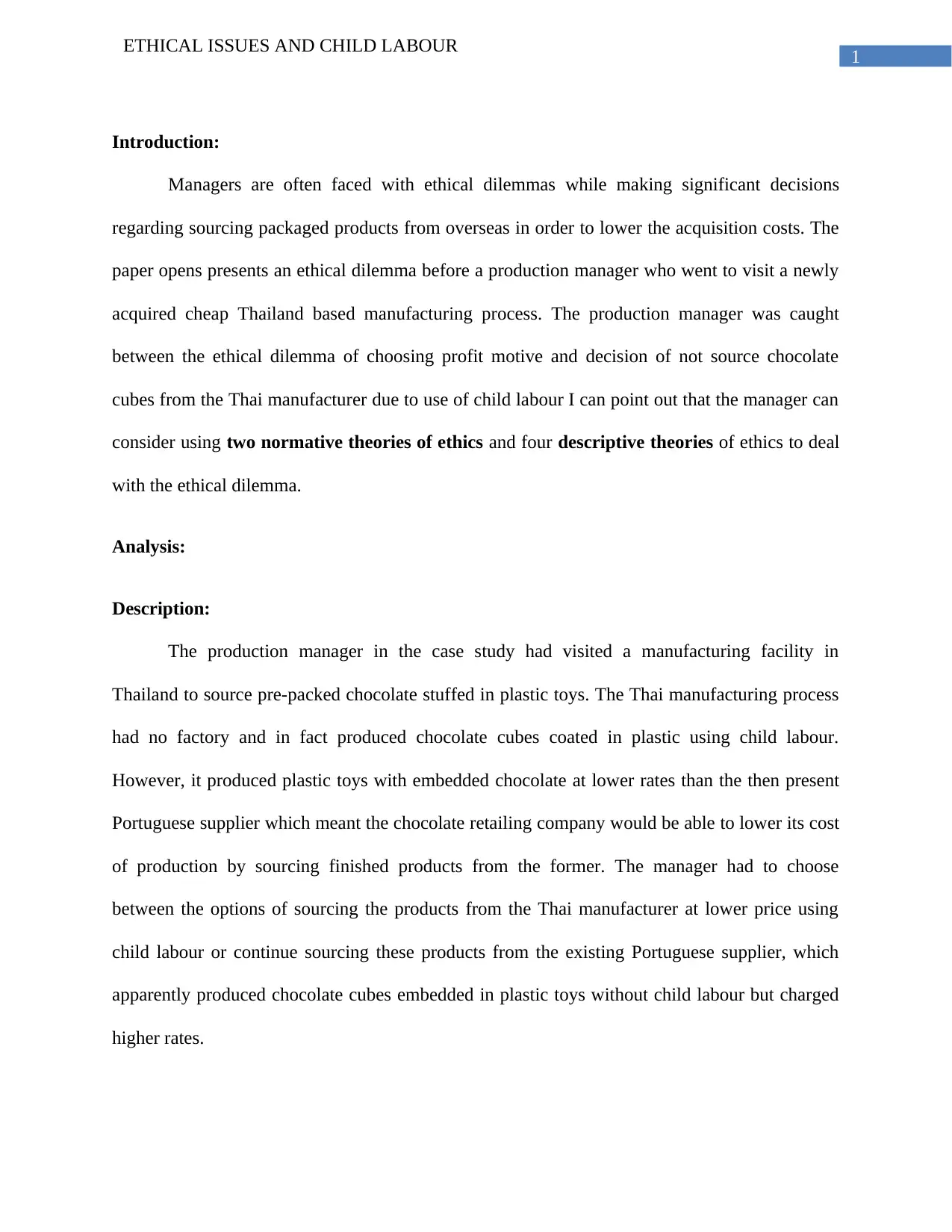
1
ETHICAL ISSUES AND CHILD LABOUR
Introduction:
Managers are often faced with ethical dilemmas while making significant decisions
regarding sourcing packaged products from overseas in order to lower the acquisition costs. The
paper opens presents an ethical dilemma before a production manager who went to visit a newly
acquired cheap Thailand based manufacturing process. The production manager was caught
between the ethical dilemma of choosing profit motive and decision of not source chocolate
cubes from the Thai manufacturer due to use of child labour I can point out that the manager can
consider using two normative theories of ethics and four descriptive theories of ethics to deal
with the ethical dilemma.
Analysis:
Description:
The production manager in the case study had visited a manufacturing facility in
Thailand to source pre-packed chocolate stuffed in plastic toys. The Thai manufacturing process
had no factory and in fact produced chocolate cubes coated in plastic using child labour.
However, it produced plastic toys with embedded chocolate at lower rates than the then present
Portuguese supplier which meant the chocolate retailing company would be able to lower its cost
of production by sourcing finished products from the former. The manager had to choose
between the options of sourcing the products from the Thai manufacturer at lower price using
child labour or continue sourcing these products from the existing Portuguese supplier, which
apparently produced chocolate cubes embedded in plastic toys without child labour but charged
higher rates.
ETHICAL ISSUES AND CHILD LABOUR
Introduction:
Managers are often faced with ethical dilemmas while making significant decisions
regarding sourcing packaged products from overseas in order to lower the acquisition costs. The
paper opens presents an ethical dilemma before a production manager who went to visit a newly
acquired cheap Thailand based manufacturing process. The production manager was caught
between the ethical dilemma of choosing profit motive and decision of not source chocolate
cubes from the Thai manufacturer due to use of child labour I can point out that the manager can
consider using two normative theories of ethics and four descriptive theories of ethics to deal
with the ethical dilemma.
Analysis:
Description:
The production manager in the case study had visited a manufacturing facility in
Thailand to source pre-packed chocolate stuffed in plastic toys. The Thai manufacturing process
had no factory and in fact produced chocolate cubes coated in plastic using child labour.
However, it produced plastic toys with embedded chocolate at lower rates than the then present
Portuguese supplier which meant the chocolate retailing company would be able to lower its cost
of production by sourcing finished products from the former. The manager had to choose
between the options of sourcing the products from the Thai manufacturer at lower price using
child labour or continue sourcing these products from the existing Portuguese supplier, which
apparently produced chocolate cubes embedded in plastic toys without child labour but charged
higher rates.
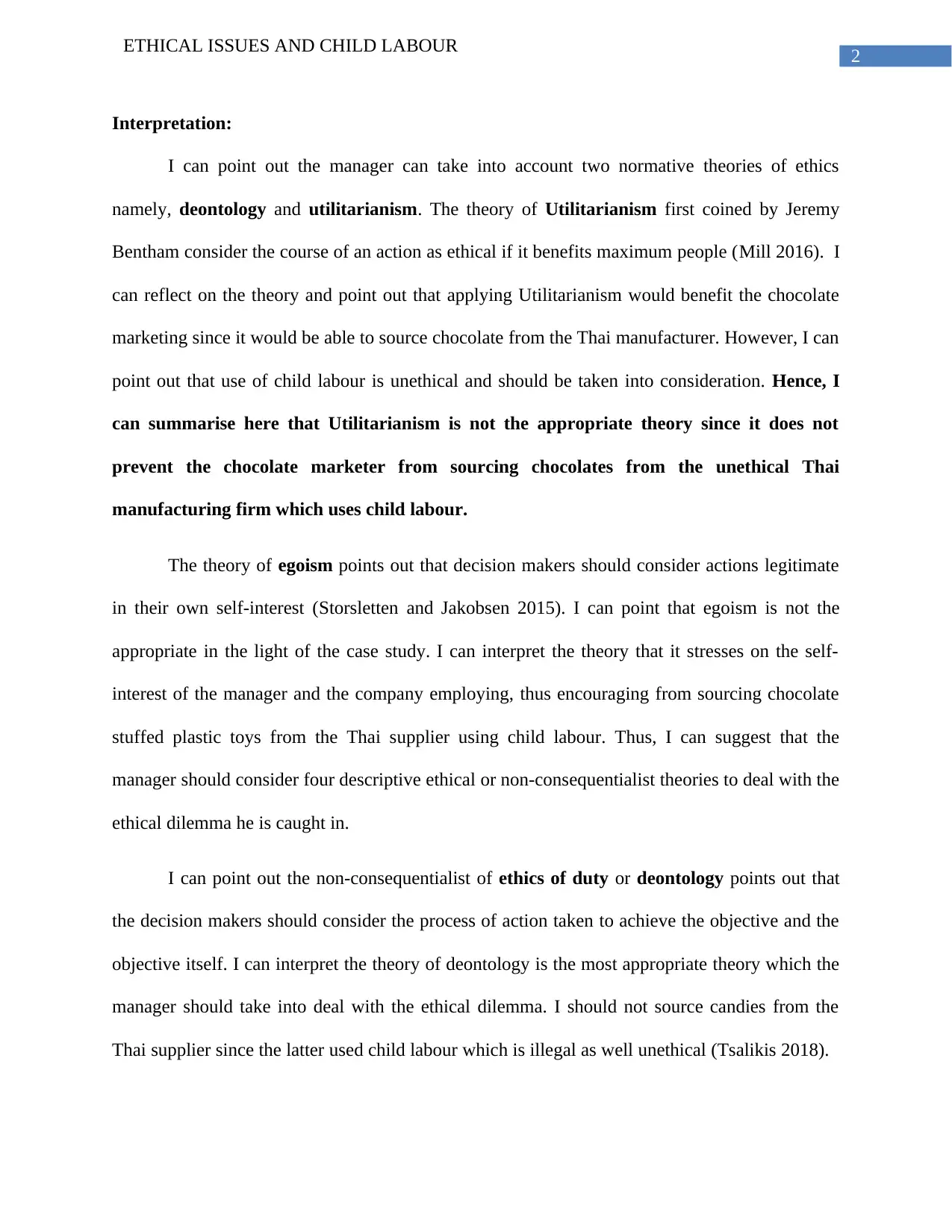
2
ETHICAL ISSUES AND CHILD LABOUR
Interpretation:
I can point out the manager can take into account two normative theories of ethics
namely, deontology and utilitarianism. The theory of Utilitarianism first coined by Jeremy
Bentham consider the course of an action as ethical if it benefits maximum people (Mill 2016). I
can reflect on the theory and point out that applying Utilitarianism would benefit the chocolate
marketing since it would be able to source chocolate from the Thai manufacturer. However, I can
point out that use of child labour is unethical and should be taken into consideration. Hence, I
can summarise here that Utilitarianism is not the appropriate theory since it does not
prevent the chocolate marketer from sourcing chocolates from the unethical Thai
manufacturing firm which uses child labour.
The theory of egoism points out that decision makers should consider actions legitimate
in their own self-interest (Storsletten and Jakobsen 2015). I can point that egoism is not the
appropriate in the light of the case study. I can interpret the theory that it stresses on the self-
interest of the manager and the company employing, thus encouraging from sourcing chocolate
stuffed plastic toys from the Thai supplier using child labour. Thus, I can suggest that the
manager should consider four descriptive ethical or non-consequentialist theories to deal with the
ethical dilemma he is caught in.
I can point out the non-consequentialist of ethics of duty or deontology points out that
the decision makers should consider the process of action taken to achieve the objective and the
objective itself. I can interpret the theory of deontology is the most appropriate theory which the
manager should take into deal with the ethical dilemma. I should not source candies from the
Thai supplier since the latter used child labour which is illegal as well unethical (Tsalikis 2018).
ETHICAL ISSUES AND CHILD LABOUR
Interpretation:
I can point out the manager can take into account two normative theories of ethics
namely, deontology and utilitarianism. The theory of Utilitarianism first coined by Jeremy
Bentham consider the course of an action as ethical if it benefits maximum people (Mill 2016). I
can reflect on the theory and point out that applying Utilitarianism would benefit the chocolate
marketing since it would be able to source chocolate from the Thai manufacturer. However, I can
point out that use of child labour is unethical and should be taken into consideration. Hence, I
can summarise here that Utilitarianism is not the appropriate theory since it does not
prevent the chocolate marketer from sourcing chocolates from the unethical Thai
manufacturing firm which uses child labour.
The theory of egoism points out that decision makers should consider actions legitimate
in their own self-interest (Storsletten and Jakobsen 2015). I can point that egoism is not the
appropriate in the light of the case study. I can interpret the theory that it stresses on the self-
interest of the manager and the company employing, thus encouraging from sourcing chocolate
stuffed plastic toys from the Thai supplier using child labour. Thus, I can suggest that the
manager should consider four descriptive ethical or non-consequentialist theories to deal with the
ethical dilemma he is caught in.
I can point out the non-consequentialist of ethics of duty or deontology points out that
the decision makers should consider the process of action taken to achieve the objective and the
objective itself. I can interpret the theory of deontology is the most appropriate theory which the
manager should take into deal with the ethical dilemma. I should not source candies from the
Thai supplier since the latter used child labour which is illegal as well unethical (Tsalikis 2018).
⊘ This is a preview!⊘
Do you want full access?
Subscribe today to unlock all pages.

Trusted by 1+ million students worldwide
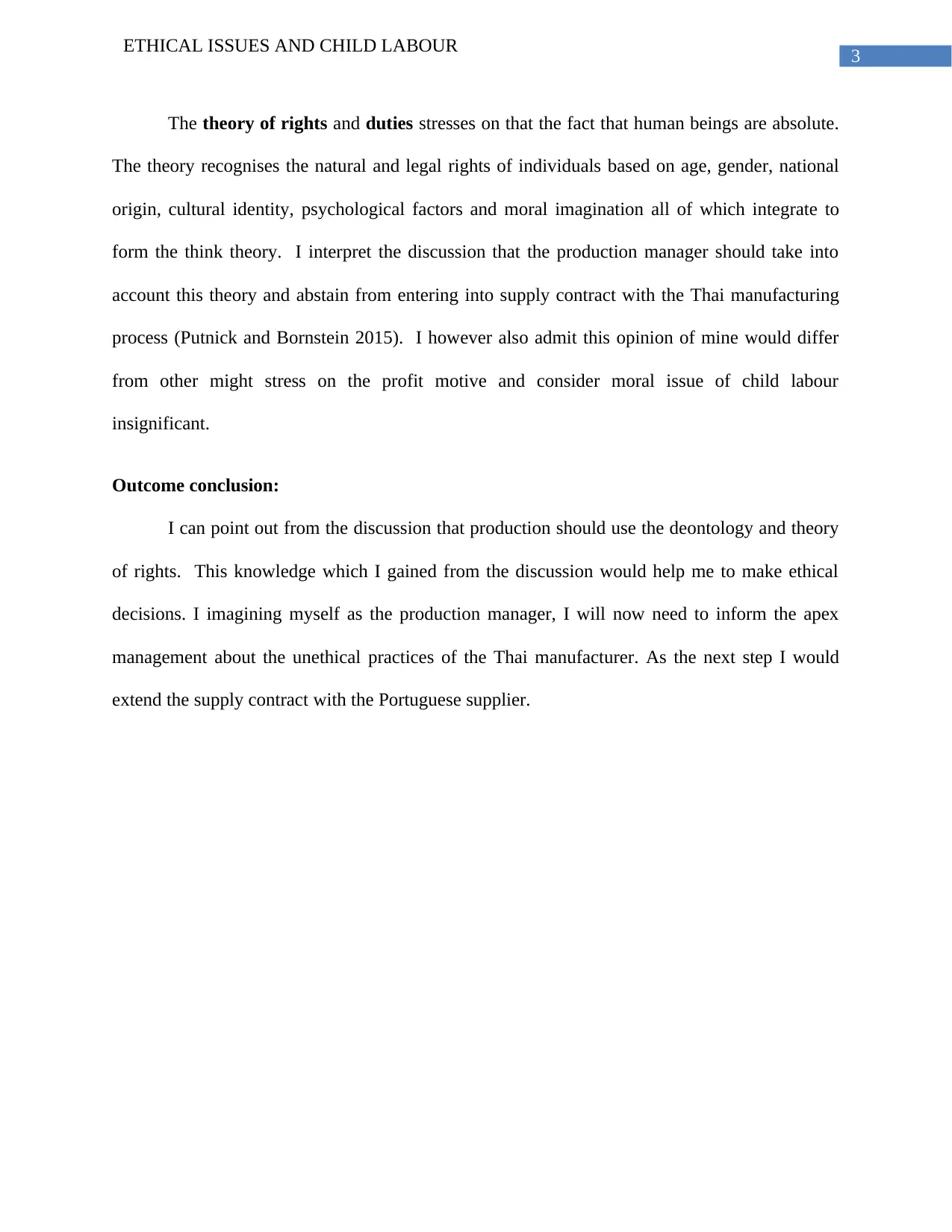
3
ETHICAL ISSUES AND CHILD LABOUR
The theory of rights and duties stresses on that the fact that human beings are absolute.
The theory recognises the natural and legal rights of individuals based on age, gender, national
origin, cultural identity, psychological factors and moral imagination all of which integrate to
form the think theory. I interpret the discussion that the production manager should take into
account this theory and abstain from entering into supply contract with the Thai manufacturing
process (Putnick and Bornstein 2015). I however also admit this opinion of mine would differ
from other might stress on the profit motive and consider moral issue of child labour
insignificant.
Outcome conclusion:
I can point out from the discussion that production should use the deontology and theory
of rights. This knowledge which I gained from the discussion would help me to make ethical
decisions. I imagining myself as the production manager, I will now need to inform the apex
management about the unethical practices of the Thai manufacturer. As the next step I would
extend the supply contract with the Portuguese supplier.
ETHICAL ISSUES AND CHILD LABOUR
The theory of rights and duties stresses on that the fact that human beings are absolute.
The theory recognises the natural and legal rights of individuals based on age, gender, national
origin, cultural identity, psychological factors and moral imagination all of which integrate to
form the think theory. I interpret the discussion that the production manager should take into
account this theory and abstain from entering into supply contract with the Thai manufacturing
process (Putnick and Bornstein 2015). I however also admit this opinion of mine would differ
from other might stress on the profit motive and consider moral issue of child labour
insignificant.
Outcome conclusion:
I can point out from the discussion that production should use the deontology and theory
of rights. This knowledge which I gained from the discussion would help me to make ethical
decisions. I imagining myself as the production manager, I will now need to inform the apex
management about the unethical practices of the Thai manufacturer. As the next step I would
extend the supply contract with the Portuguese supplier.
Paraphrase This Document
Need a fresh take? Get an instant paraphrase of this document with our AI Paraphraser
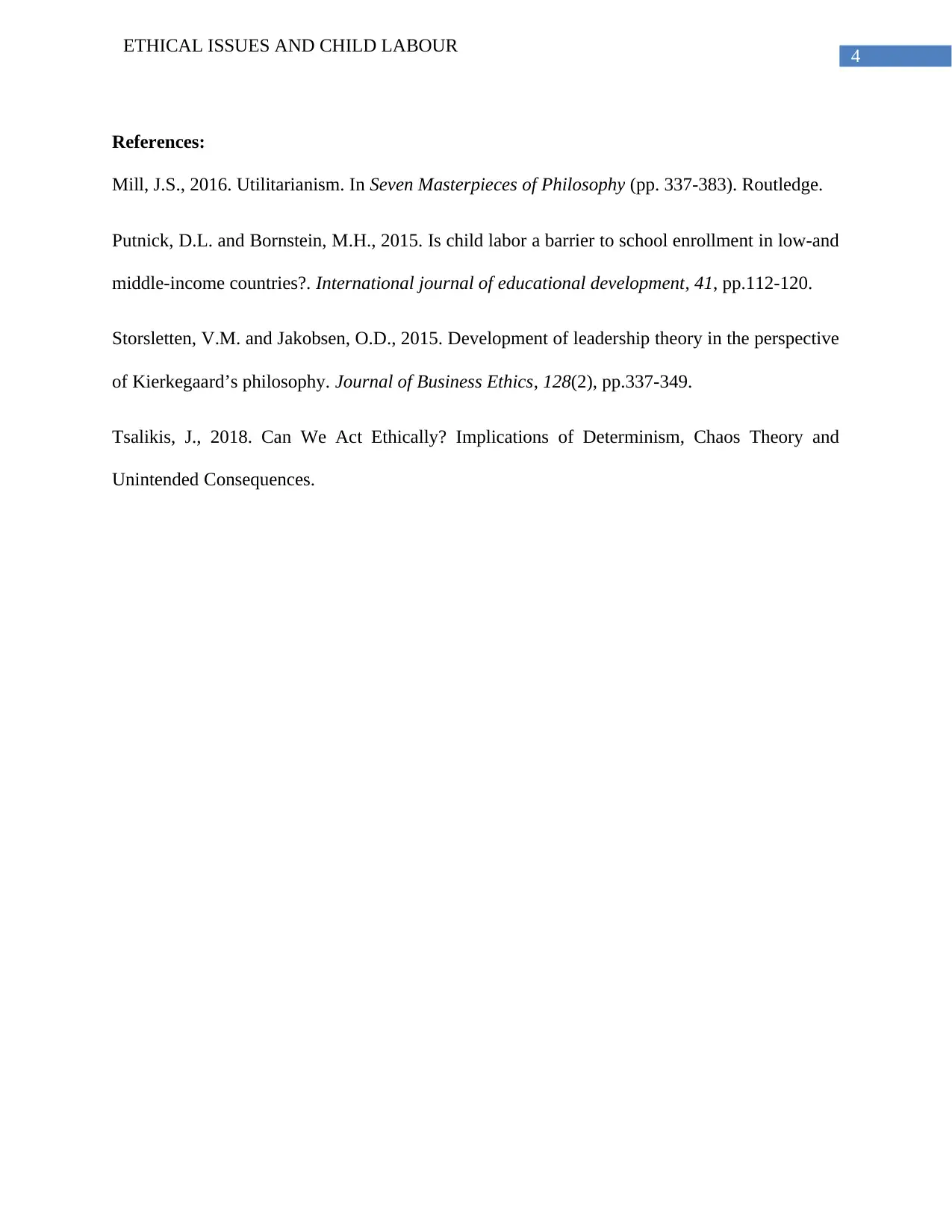
4
ETHICAL ISSUES AND CHILD LABOUR
References:
Mill, J.S., 2016. Utilitarianism. In Seven Masterpieces of Philosophy (pp. 337-383). Routledge.
Putnick, D.L. and Bornstein, M.H., 2015. Is child labor a barrier to school enrollment in low-and
middle-income countries?. International journal of educational development, 41, pp.112-120.
Storsletten, V.M. and Jakobsen, O.D., 2015. Development of leadership theory in the perspective
of Kierkegaard’s philosophy. Journal of Business Ethics, 128(2), pp.337-349.
Tsalikis, J., 2018. Can We Act Ethically? Implications of Determinism, Chaos Theory and
Unintended Consequences.
ETHICAL ISSUES AND CHILD LABOUR
References:
Mill, J.S., 2016. Utilitarianism. In Seven Masterpieces of Philosophy (pp. 337-383). Routledge.
Putnick, D.L. and Bornstein, M.H., 2015. Is child labor a barrier to school enrollment in low-and
middle-income countries?. International journal of educational development, 41, pp.112-120.
Storsletten, V.M. and Jakobsen, O.D., 2015. Development of leadership theory in the perspective
of Kierkegaard’s philosophy. Journal of Business Ethics, 128(2), pp.337-349.
Tsalikis, J., 2018. Can We Act Ethically? Implications of Determinism, Chaos Theory and
Unintended Consequences.
1 out of 5
Related Documents
Your All-in-One AI-Powered Toolkit for Academic Success.
+13062052269
info@desklib.com
Available 24*7 on WhatsApp / Email
![[object Object]](/_next/static/media/star-bottom.7253800d.svg)
Unlock your academic potential
Copyright © 2020–2026 A2Z Services. All Rights Reserved. Developed and managed by ZUCOL.



